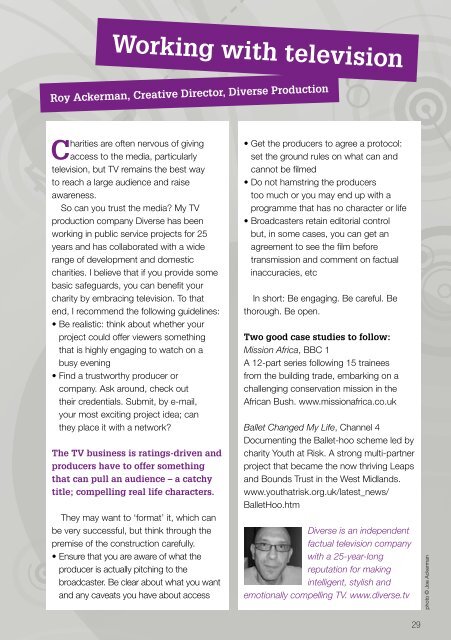Clever Communications - Voluntary Action Media Unit
Clever Communications - Voluntary Action Media Unit
Clever Communications - Voluntary Action Media Unit
You also want an ePaper? Increase the reach of your titles
YUMPU automatically turns print PDFs into web optimized ePapers that Google loves.
Working with television<br />
Roy Ackerman, Creative Director, Diverse Production<br />
Charities are often nervous of giving<br />
access to the media, particularly<br />
television, but TV remains the best way<br />
to reach a large audience and raise<br />
awareness.<br />
So can you trust the media? My TV<br />
production company Diverse has been<br />
working in public service projects for 25<br />
years and has collaborated with a wide<br />
range of development and domestic<br />
charities. I believe that if you provide some<br />
basic safeguards, you can benefit your<br />
charity by embracing television. To that<br />
end, I recommend the following guidelines:<br />
• Be realistic: think about whether your<br />
project could offer viewers something<br />
that is highly engaging to watch on a<br />
busy evening<br />
• Find a trustworthy producer or<br />
company. Ask around, check out<br />
their credentials. Submit, by e-mail,<br />
your most exciting project idea; can<br />
they place it with a network?<br />
The TV business is ratings-driven and<br />
producers have to offer something<br />
that can pull an audience – a catchy<br />
title; compelling real life characters.<br />
They may want to ‘format’ it, which can<br />
be very successful, but think through the<br />
premise of the construction carefully.<br />
• Ensure that you are aware of what the<br />
producer is actually pitching to the<br />
broadcaster. Be clear about what you want<br />
and any caveats you have about access<br />
• Get the producers to agree a protocol:<br />
set the ground rules on what can and<br />
cannot be filmed<br />
• Do not hamstring the producers<br />
too much or you may end up with a<br />
programme that has no character or life<br />
• Broadcasters retain editorial control<br />
but, in some cases, you can get an<br />
agreement to see the film before<br />
transmission and comment on factual<br />
inaccuracies, etc<br />
In short: Be engaging. Be careful. Be<br />
thorough. Be open.<br />
Two good case studies to follow:<br />
Mission Africa, BBC 1<br />
A 12-part series following 15 trainees<br />
from the building trade, embarking on a<br />
challenging conservation mission in the<br />
African Bush. www.missionafrica.co.uk<br />
Ballet Changed My Life, Channel 4<br />
Documenting the Ballet-hoo scheme led by<br />
charity Youth at Risk. A strong multi-partner<br />
project that became the now thriving Leaps<br />
and Bounds Trust in the West Midlands.<br />
www.youthatrisk.org.uk/latest_news/<br />
BalletHoo.htm<br />
Diverse is an independent<br />
factual television company<br />
with a 25-year-long<br />
reputation for making<br />
intelligent, stylish and<br />
emotionally compelling TV. www.diverse.tv<br />
29<br />
photo © Joe Ackerman


